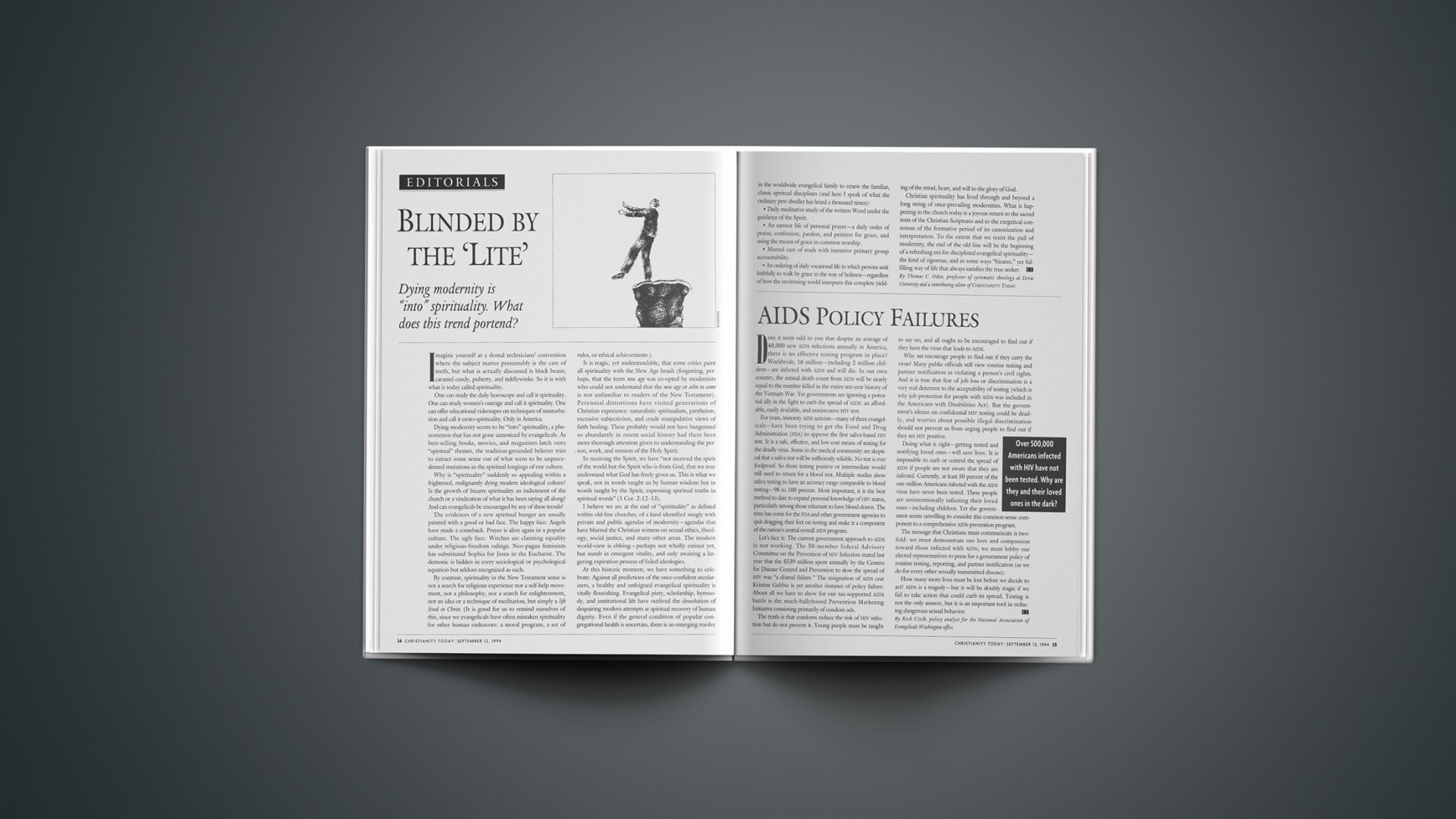Does it seem odd to you that despite an average of 40,000 new AIDS infections annually in America, there is no effective testing program in place? Worldwide, 16 million—including 2 million children—are infected with AIDS and will die. In our own country, the annual death count from AIDS will be nearly equal to the number killed in the entire ten-year history of the Vietnam War. Yet governments are ignoring a potential ally in the fight to curb the spread of AIDS: an affordable, easily available, and noninvasive HIV test.
For years, minority AIDS activists—many of them evangelicals—have been trying to get the Food and Drug Administration (FDA) to approve the first saliva-based HIV test. It is a safe, effective, and low-cost means of testing for the deadly virus. Some in the medical community arc skeptical that a saliva test will be sufficiently reliable. No test is ever foolproof. So those testing positive or intermediate would still need to return for a blood test. Multiple studies show saliva testing to have an accuracy range comparable to blood testing—98 to 100 percent. Most important, it is the best method to date to expand personal knowledge of HIV status, particularly among those reluctant to have blood drawn. The time has come for the FDA and other government agencies to quit dragging their feet on testing and make it a component of the nation’s central overall AIDS program.
Let’s face it: The current government approach to AIDS is not working. The 50-member federal Advisory Committee on the Prevention of HIV Infection stated last year that the $539 million spent annually by the Centers for Disease Control and Prevention to slow the spread of HIV was “a dismal failure.” The resignation of AIDS czar Kristine Gebbie is yet another instance of policy failure. About all we have to show for our tax-supported AIDS battle is the much-ballyhooed Prevention Marketing Initiative consisting primarily of condom ads.
The truth is that condoms reduce the risk of HIV infection but do not prevent it. Young people must be taught to say no, and all ought to be encouraged to find out if they have the virus that leads to AIDS.
Why not encourage people to find out if they carry the virus? Many public officials still view routine testing and partner notification as violating a person’s civil rights. And it is true that fear of job loss or discrimination is a very real deterrent to the acceptability of testing (which is why job protection for people with AIDS was included in the Americans with Disabilities Act). But the government’s silence on confidential HIV testing could be deadly, and worries about possible illegal discrimination should not prevent us from urging people to find out if they are HIV positive.
Doing what is right—getting tested and notifying loved ones—will save lives. It is impossible to curb or control the spread of AIDS if people are not aware that they are infected. Currently, at least 50 percent of the one million Americans infected with the AIDS virus have never been tested. These people are unintentionally infecting their loved ones-including children. Yet the government seems unwilling to consider this common-sense component to a comprehensive AIDS-prevention program.
The message that Christians must communicate is twofold: we must demonstrate our love and compassion toward those infected with AIDS; we must lobby our elected representatives to press for a government policy of routine testing, reporting, and partner notification (as we do for every other sexually transmitted disease). How many more lives must be lost before we decide to act? AIDS is a tragedy—but it will be doubly tragic if we fail to take action that could curb its spread. Testing is not the only answer, but it is an important tool in reducing dangerous sexual behavior.
********************
Rich Cizik is policy analyst for the National Association of Evangelical Washington office.
Copyright © 1994 Christianity Today. Click for reprint information.










